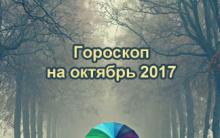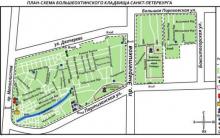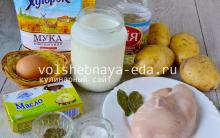Entertainment summary for speech development in the senior group
Description of material: This summary will be useful to kindergarten teachers of older groups.
Target: Development of coherent speech.
Tasks:
1. Consolidate knowledge of fairy tales.
2. Improve children's ability to solve riddles.
3. Develop monologue, dialogic, coherent speech.
4. Cultivate an emotional response to well-known and beloved fairy tales and friendship.
Equipment: tape recorder, flower with petals, fairy toy beautiful speech, illustrations with fairy tales
course of entertainment:
Educator: - Guys, when you came to the group today, did you notice anything unusual? (unusual flower).
Educator: Who do you think could have given it to us? (children's answers).
-And it was given by the Fairy of Beautiful Speech, who lives in the Land of Knowledge. She was in a hurry and left “Rechtsvetik” with tasks. Whoever copes with the task better will be in for a surprise, so try very hard. And the tasks are written on the petals of the speech flower. By completing the tasks, we will show the fairy of beautiful speech what we have learned over the year. So, are you ready?
So 1 task the fairy of beautiful speech suggests remembering the fairy tale about the merry tongue. I will tell the fairy tale and you will show the movements of the tongue.
The fairy tale “About the Merry Tongue”
The mouth is a house, lips are doors.
Who lives in this house?
In this house, my friend,
Cheerful Tongue lives.
Oh, and he's a smart boy,
And a little naughty.
(The mouth is open, a narrow tongue is shown several times. Exercise “Arrow”.)
Our Cheerful Tongue
He turned on his side.
Looks left, looks right...
And then forward again,
Take a little rest here.
(Exercises “Clock”, “Snake”.)
Tongue opened the window,
And it's warm outside.
Our tongue stretched out
He smiled at us widely,
And then I went for a walk,
sunbathe on the porch.
(Exercise “Smile”, “Sting”, “Arrow”.)
Lying on the porch
He ran to the swing.
He flew up boldly...
But it's time to get down to business.
(Exercises “Spatula”, “Swing”.)
He hurried to his yard,
To fix the fence.
He quickly got down to business
And the work began to boil.
(Exercise “Fence”.)
Nails, hammer and pliers -
Things a carpenter needs.
The hammer knocks "knock-knock!"
He is tongue's best friend.
(The mouth is closed. The teeth are exposed. With the tense tip of the tongue, tap on the teeth, repeating “t-t-t” repeatedly.)
There's a can of paint next to it.
The fence needs to be updated.
The tassel began to dance,
Our fence is unrecognizable.
Exercise "Painter".)
Our tongue finished the job.
He can rest safely
- I'll take my horse for a walk,
I'll play the harmonica for her.
I'm playing football
And I'll score a goal.
A very difficult task -
Drive the ball into the goal.
(Exercises “Horse”, “Accordion”, “Football”.)
The sun hid behind the mountain,
The tongue went home.
He locked the door.
He lay down in bed and fell silent.
(Exercises “Slide”, “Spatula”.)
Well done, you completed the first task. Let's tear off the second petal.
“Say the opposite” task
Pinocchio is cheerful, and Pierrot is sad
The crow is heavy and the butterfly is light
The witch is evil, and the fairy is good
The highway is wide, but the path is narrow
The ocean is deep and the puddle is shallow
The snake is smooth, and the fox is fluffy,
The wolf in the forest is hungry, but the dog in the forest is well-fed
It's hot in summer and cold in winter,
The pine is tall and the Christmas tree is low
The tights are long and the socks are short
The bun is soft, but the cracker is hard
It's dark at night and light during the day
The cobweb is thin, but the rope is thick
The star is small, but the sun is big
We tear off the next petal.
- Children, do you like fairy tales? (Children's answers)
Guess the riddles.
1) Escaped from the dirty people
Cups, spoons and pans
She is looking for them, calling them.
And on the way tears are shed. (Fedora) Fairy tale “Fedorino’s grief”
2) And the little hare and the she-wolf -
Everyone runs to him for treatment. (Aibolit) Fairy tale “Doctor Aibolit”
3) Gobbling up rolls,
A guy was riding on a stove.
Rode around the village
And he married the princess. (Emelya) Fairy tale “At the command of the pike.”
4) Waited for mother with milk
And they let the wolf into the house,
Who were these
Small children? (Seven little goats) Fairy tale “The Wolf and the Seven Little Goats”
5) Above my simple question
You won't spend much effort
Who is the boy with the long nose?
Made it from logs. (Papa Carlo) Fairy tale “The Golden Key”
4 petal task.I have cubes on which vowel and consonant sounds are written. But they are all mixed up. Your task is to sort the cubes into 2 groups. 1 vowels. 2 consonants. But in order not to get confused, first let’s remember how vowel sounds differ from consonants.
5 petal. I will read poetry to you, and you will correct mistakes. And the team captain will show how many syllables are in the added word. Examples of poems:
Smoke billows out of the oven, and a delicious BOOT bakes in it. (that's right - pie)
A bee will drink nectar from a flower and make sweet ICE. (honey)
The steamboat floats along the river, and it puffs like a CANDLE. (stove)
Who cracks nuts finely? Well, of course it's a HEATING HEATTER. (squirrel)
Rumbling just in case, a HEAP of rain brought us. (cloud)
And we have one more petal left. The fairy of beautiful speech opened the book and saw a drawing, but it is not colored. You need to color only those objects in which the sound (L) is found. Well done, you completed all the fairy’s tasks. And she left you a surprise, help yourself.
Our red flowers
Spreading the petals
The breeze breathes a little,
The petals are swaying.
Our red flowers
Petals close
They shake their heads,
They fall asleep quietly.
Objectives of the lesson.
o consolidate children's knowledge of fairy tales by K.I. Chukovsky and poems by A. Barto;
o encourage children to show speech activity by telling program poems and fairy tales;
o evoke a joyful emotional mood in children;
o to form intonational expressiveness of children’s speech;
o strengthen children’s ability to emotionally perceive the content of works of art;
o develop the ability to convey images of characters: facial expressions and gestures.
Progress of the lesson.
Presenter 1: Guys, today we will go on a journey to the land of fairy tales and poems. Want to?
Presenter 2: Only this fabulous country is very far away. We can't get there on foot. Let's go on a steam train? The trailers get out, hitch up. Go!
Presenter 1: Guys, we have arrived at an unusual clearing. She's magical. Look how beautiful it is here! How many flowers, birds. Various fairy tales live in this clearing. Sit down and let's find out who is the first to rush to visit us.
Presenter 2: But to find out who it is, you need to solve the riddle.
Small, but remote.
Everything flies and buzzes...
Presenter 1st : Where is our fly? Here's a fly. Fly Tsokotukha. And the storyteller from a magical land, Ira Buslova, will tell us a fairy tale about a fly. And you listen carefully.
Dramatization of an excerpt from a fairy tale by K.I. Chukovsky "Fly - clattering".
Leading 2nd : Fly, fly - clattering fly, what do you like to eat most?
Fly and children : Fruits!!!
Presenter 1st : Right. There are so many fruits growing in our magical meadow. Now, fly, the guys will pick fruit for you.
The game “Collect Fruits” is played: while the music is playing, children collect only fruits.
Presenter 2: Here's a fly, fruit for you ( a bowl of fruit is placed in the middle of the group, a fly flies up to it). And the guys and I know a funny song about a fly.
Children, together with the presenters, perform the musical game “Shoot, Fly, Fly Away!” (disc no. 2, track 5).
Presenter 1: What great guys! And they collected the fruit and drove away the fly. Are your hands clean? Show us ( The presenters pass from both sides and check the children’s palms. Suddenly they find a girl with dirty hands ami). What kind of girl is this? Come out to us. What kind of dirty girl is that?!
A dramatization of A. Barto’s poem “Oh, you grimy girl.”
Presenter 1: Are you really tanned? Let's check ( presenter, wet wipe, washes the nose of a grimy girl). Yes, there is polish on your neck, there is a blot under your nose.
Presenter 2: What do we guys need to do with the dirt? ( wash). Who will we call for help? ( Moidodyra).
The group includes Moidodyr. Dramatization of an excerpt from a fairy tale by K.I. Chukovsky "Moidodyr". Then Moidodyr, using a damp cloth, wipes the “dirty” palms.
Presenter 2: Guys, let's all wash our hands together so that we have clean ones. Join us in a circle.
Children, together with the presenters, perform the musical game “We Wash Our Hands” (disc No. 25, track 27).
Presenter 1: Well done boys! Sit down. Hear, someone is rushing towards us ( the musical screensaver “Little Bunnies” is turned on, disc No. 25, track 36). Who could it be? Bunnies run out to the children - guys. That's right, these are bunnies.
A dramatization of A. Barto's poem "Bunny".
Leading 2nd : Guys, you and I know the round dance “The Little Gray Bunny Is Sitting.” Let's please our little guests.
Children, together with the presenters, perform the musical game “The gray bunny is sitting”
Presenter 2: Another fairy tale is hidden in our clearing. Here is the house. Whose house is this? Who lives in it? ( Cat). Right. Where is our cat...
Staging of the nursery rhyme “Tili - bom!”
Presenter 1st : Well, our journey has come to an end. We need to go to kindergarten. Delicious tea with sweets awaits us there.
Leading 2nd : The train is waiting for us. Too-too! The carriages stand. Go!
Children, together with the presenters, perform the musical game “Locomotive, chuh - chuh - chuh” (disc No. 25, track 29).
Fun for speech development
Middle group
"Riddles from Prostokvashino"
Software tasks:
To consolidate knowledge, skills and abilities to use and use synonyms in children’s speech;
Strengthen the ability to select adjectives;
Teach children to convey the image of a hero through facial expressions and gestures;
Continue to strengthen children's ability to classify objects according to one sign.
Progress of the lesson:
Educator: Guys, guests came to us today to watch us play and take part in our game. How are guests greeted? Let's say hello and meet the guests.
finger game "Guests"
The children began to invite guests,
The children began to treat the guests.
Each guest got jam.
My fingers were glued together by that treat.
Just pressed palm to palm.
Guests cannot even take spoons.
Visit us today kindergarten a strange letter arrived. Now let's see who it came from. There is a riddle on the envelope, let's guess it and find out who sent it to us.
Lives in Prostokvashino
He carries out his service there.
The post office house is located by the river,
The postman in it is uncle......
Pechkin reports that a package has arrived for us, but in order to receive it, we will need to complete the tasks that he has prepared for us. The first task is to guess the riddles of which fairy tale heroes are in the envelope.
I went to visit my grandmother,
I brought the pies to her.
The gray wolf was watching her,
Deceived and swallowed.
We were waiting for mother with milk,
And they let the wolf into the house.
Who were these
Small children?
She is the most important mystery of all,
Even though she lived in the cellar:
Pull the turnip out of the garden
Helped my grandfather and grandmother.
Near the forest on the edge,
Three of them live in a hut.
There are three chairs and three mugs,
Three beds, three pillows.
Guess without a hint
Who are the heroes of this fairy tale?
Answer the question:
Who carried Masha in the basket,
Who sat on the tree stump
And wanted to eat a pie?
You know the fairy tale, right?
Who was it……..?
Well done! We completed the task! Pechkin, although good, does the opposite. Let us also say the words in reverse. (Children stand in a circle) The teacher throws the ball to each child and he calls the word with the opposite meaning.
We say white, but Pechkin is black, sweet-bitter, big-small, tall-short, thick-thin, loud-quiet, day-night, long-short, kind angry, cold - hot……….
At the post office, Pechkin was asked to paste pictures, but he again mixed everything up and pasted one extra.
The game "Fourth wheel" is played. Children are divided into groups and collect cards, highlighting the extra ones. Then they explain their choice.
Educator: Who else lived in Prostokvashino?
Children: The cat Matroskin still lived in Prostokvashino.
Children find a toy cat, pass it to each other and pronounce adjectives.
Educator: What is he like?
Children: He is kind, fluffy…. (children's answers).
Educator: Show what he is like when he is happy, sad, angry... (children show)
Educator: Let's play together with Matroskin
A physical education session is held:
Like our cat -
Huge eyes.
Like our cat -
Sharp claws.
The cat is washing itself,
It's getting cleaner every day.
Shakes off his face
From leftover food.
And in the evening he hunts
In the closet behind the mice
And plays okay
With fluffy cats.
Educator: But Pechkin still doesn’t give us the parcel, he has prepared another task for us. I cut and mixed up all the pictures. Let's help you pick up and put everything in its place.
The game “Match the pictures” is being played.
Educator: So we completed this task. All of Pechkin's riddles have been solved. And here is our package, but it does not open, there is a lock on it. Let's try to open the lock.
Held finger gymnastics"There's a lock on the door."
The package opens and there is a treat for the children.
Speech development fun for children middle group"Toys"
Target: Create a joyful mood in children, consolidate children’s knowledge about the works of A. L. Barto, develop children’s activity, expressiveness of speech, memory, and develop a sense of self-confidence in children.
Tasks: develop speech activity, coherent speech of children, memory, attention, thinking; cultivate interest in literary works;
Preliminary work: reading A. Barto’s poems in a group, looking at illustrations for the works.
Material: images of toys - bear, bull, bunny, horse, Tanya doll; bear toy, ribbed track; ball.
Progress of entertainment.
Educator: Guys, look who came to visit you today! It's Mikhail the bear! He brought interesting pictures to you and wants to play with you, do you want?
Children: Yes!
Educator: Guess the riddle:
They beat him, but he doesn’t cry, he just jumps higher, higher?
(Ball)
Our Tanya is crying loudly,
She dropped a ball into the river.
Hush, Tanechka, don't cry,
The ball will not drown in the river.
Educator: To calm Tanya down, we will play a game with her.
Game "Which, which, which." (The sun is round, yellow, bright; the sky is blue, beautiful; the doll is beautiful, new; the house is big, orange, etc.)
Children sit on chairs.
Educator: Who is this?
Children: bunny
Educator: Do you know a poem about a bunny?
The teacher and the children recall the poem:
The owner abandoned the bunny.
A bunny was left in the rain.
I couldn't get off the bench,
I was completely wet.
Educator: Let’s calm the bunny down and play the game “It’s the bunny’s birthday.”
Q: It’s the bunny’s birthday. The bunny prepared various treats (shows object pictures: nuts, fish, honey). Guess who the bunny prepared nuts for? Fish? Honey?
D: nuts - squirrel
Fish - fox
Honey for the bear
Educator:
Look how beautiful I am
Both the tail and mane are good,
Clack, clack, clatter, hooves are knocking,
Don't you want to go for a ride? Who is this?
(Horse)
The teacher and the children recall the poem:
I love my horse
I'll brush her fur smoothly.
I will smooth the tail with a comb,
And I’ll go on horseback to visit.
Educator: How does the horse click? (children show). Let's gallop like horses.
Educator: Children, look, who is it?
Children: Bull.
The teacher and the children recall the poem:
The bull is walking, swaying,
Sighs as he walks:
- Oh, the board ends,
Now I'm going to fall!
Educator: Let's show Bull how to walk along the ribbed path
carefully so as not to fall.
Educator: Well done.
Educator:
Clubfoot and big
Who sleeps in a den in winter?
Children answer... (bear.)
The teacher and the children recall the poem:
They dropped the bear on the floor.
They tore off the bear's paw.
I still won't leave him.
Because he's good.
Educator: Let's play the game “Call it affectionately” with the bear - the children stand in a circle and pass the bear to each other and call it affectionate, good words.
Educator: Guys, did you like playing with the bear? Who did we see today? What they were doing?
Children: (children's answers).
Educator: Let's say goodbye to the bear!
MBDOU kindergarten No. 55 “Ryabinka”
Abstract of entertainment for speech development "B" book corner»
for children of senior preschool age
Buldakova Irina Vasilievna
Teacher speech therapist
Entertainment for speech development “In the book corner”
For children of senior preschool age.
Target: find out how well children are familiar with Russian folk and original fairy tales, works, poems, whether they know their names, dialogues, characters, whether they can characterize the main character, whether they understand the idea of the fairy tale; improve the expressiveness of children’s speech, consolidate the ability to use when answering various types proposals; develop children's memory, creative imagination, and fantasy.
Equipment: poem by I. Tokmakova “Read to me, mother”, poster, books (illustrations): C. Perrault “Little Red Riding Hood”, S. Marshak “The Story of an Unknown Hero”, Russian folk tale“Geese-swans”, A. Barto “About toys”, toys, theater (masks) “Teremok”.
Progress of entertainment:
Educator: Guys, today we are meeting you in the book corner. It is very good when a person can read himself. Almost all of our kids can read too. Listen to I. Tokmakova’s poem “Read to me, Mom.”
When my mother reads a book to me,
It’s not at all what I read to myself.
Although I know the letters perfectly well
And I’ve already read Aibolit myself.
But if mom sits next to her with a book,
This book is so interesting to listen to!
It’s like there’s a brave captain in the wheelhouse,
Who is not afraid of evil pirates,
That’s just it – myself!
Or I go on patrol at the border,
Or in a rocket heading towards the sun,
And the fearless astronaut is me too!
I ask you, read to me, mother,
Today I feel like I'm going to become a bird
And I’ll save poor Thumbelina!
For books to live long, you need to take care of them. What rules for handling books do you know? (The teacher shows a poster with the inscription: “This book is sick: my brother tore it up. I will feel sorry for the sick one: I will take it and glue it together.”)
Children: children's answers.
Educator: Guys, can you guess the book from the picture? Let's play a guessing game! (the teacher shows the children illustrations for the works: “Little Red Riding Hood”, “The Tale of an Unknown Hero”, “Swan Geese”. The children guess the works.
Educator: Guys, look what toys we have in the group. Do you happen to know poems about them?
(Children remember A. Barto’s poems from the series “About Toys”: “They dropped the bear on the floor”, “The mistress abandoned the bunny”, “I love my horse”, “Our Tanya is crying loudly”
Educator: Well done! Now, listen to the words and think about which characters and from which work they belong:
“I don’t have a mustache, but a mustache,
Not paws, but paws,
Not teeth, but teeth..."
"Oh, if I drown,
If I go down,
What will happen to the sick?
With my forest animals?
Well done, and they coped with this task!
Educator: Guys, remember what work these words are from:
Fly, fly, petal,
Through West to East…..
Children: children's answers.
Educator: That's right, these are words from the fairy tale “Flower - Seven Flowers.” Do you remember who main character this fairy tale?
Children: girl Zhenya.
Educator: Where did she get the seven-flowered flower from?
Children: children's answers.
Educator: Guys, do you think Zhenya disposed of the seven-flowered petals correctly, why?
Children: children's answers.
Educator: Well done boys!
Educator: Remember, we recently learned a joke: “You and I were walking,” let’s play.
The teacher and the children play a comic dialogue game:
Did we go with you?
Did you find the gingerbread?
What? Etc. repeated 6-7 times.
Educator: Guys, let's play some theater. (Some of the children remain spectators, and the other part show the fairy tale “Teremok”)
Educator: Our book gatherings are coming to an end. Did you enjoy the book corner? I also really enjoyed playing with you. (The teacher gives all children small books as souvenirs.)











Dua for Sadness Anxiety and Depression
Buddhism: the basics of religion, how many Buddhists are there in the world
Obligatory prayers: features and order of performance by men
Druid horoscope by date of birth: interpretation and features
What is oregano: all about the amazingly healthy seasoning!